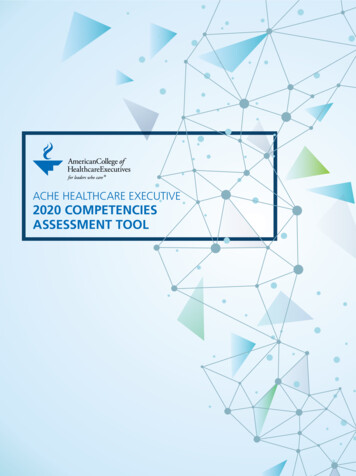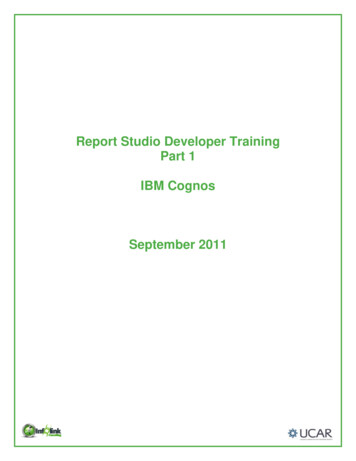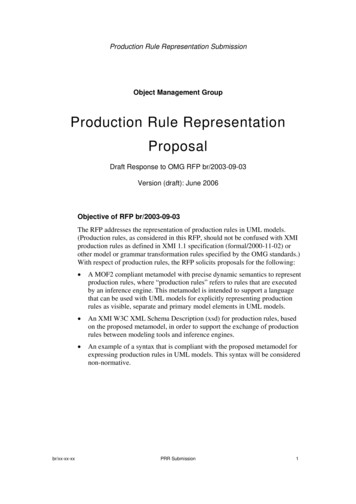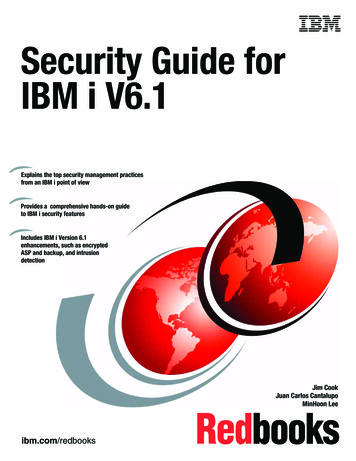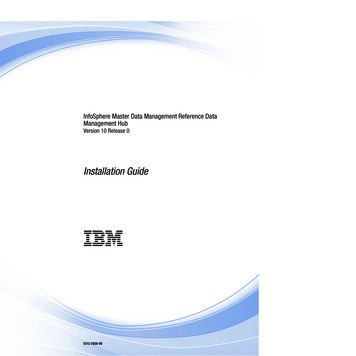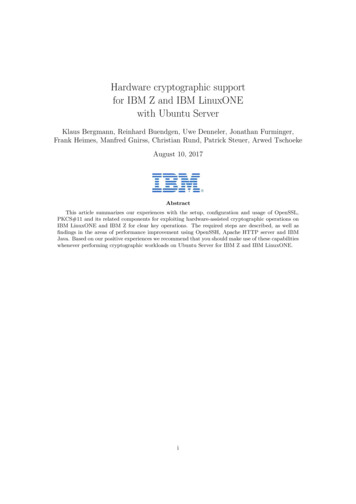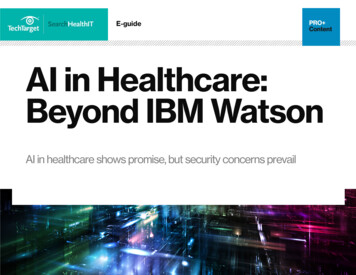
Transcription
E-guideAI in Healthcare:Beyond IBM WatsonAI in healthcare shows promise, but security concerns prevail
E-guideIn this e-guideFour uses for artificialintelligence in healthcarep.2AI in healthcare mustovercome security,interoperability concernsp.7Five ways a healthcare virtualassistant can improve patientengagementp.11Six health IT trends andBut today, AI in healthcare goes beyond Watson. In this eguide, discover: 4 key uses for AI in a healthcare settings Security and interoperability concerns surrounding AI How AI can improve patient engagement 6 health IT trends to watch in 2017 (Hint: AI is included!)technologies executivesshould watch in 2017p.15About SearchHealthITp.19Page 1 of 19In this e-guide:IBM Watson is without a doubt the most well-known use ofartificial intelligence (AI) in healthcare and has been used in anumber of disciplines, including with payers, oncology, andpatient risk assessment.
E-guideIn this e-guideFour uses for artificial intelligence inhealthcareFour uses for artificialintelligence in healthcarep.2AI in healthcare mustovercome security,interoperability concernsp.7Five ways a healthcare virtualassistant can improve patientengagementp.11Six health IT trends andtechnologies executivesshould watch in 2017p.15About SearchHealthITp.19Page 2 of 19Reda Chouffani, Co-founder Biz Technology SolutionsWe surround ourselves with technology that is able to help us in our dailylives. The success of autonomous cars, advancements in clinical researchand personal digital assistants has shown the incredible potential oftechnology and how far it has come in recent decades. Despite the progressthat many other industries have made, healthcare is likely to be the onemarket where artificial intelligence can truly have an impact that goesbeyond convenience and positively affects human lives.Artificial intelligence (AI) is defined as the science and engineering ofcreating intelligent computer systems that are able to perform tasks withoutreceiving instructions directly from humans. These computer systems use anumber of different algorithms and decision-making capabilities, as well asvast amounts of data, to provide a solution or response to a request.Today, more than ever, many technology vendors are making significantinvestments in AI to ensure they are able to offer solutions and services thatcan use the technology. Microsoft, Google, Apple, IBM and Amazon, to namea few, have all adopted and fully committed to AI and are already providingthese services to consumers.
E-guideAnytime a new technology enters healthcare, there are a number ofchallenges it faces. Common setbacks of artificial intelligence in healthcareinclude a lack of data exchange, regulatory compliance requirements andpatient and provider adoption. AI has come across all of these issues,narrowing down the areas in which it can succeed.In this e-guideFour uses for artificialintelligence in healthcarep.2AI in healthcare mustovercome security,interoperability concernsp.7Five ways a healthcare virtualassistant can improve patientThe most popular use of artificial intelligence in healthcare is in IBM's smartcloud, where Watson lives. The Watson platform has been used in a numberof disciplines within healthcare including with payers, oncology and patientrisk assessment.There are a number of other applications within healthcare where AI candeliver incredible value, but healthcare executives must evaluate and see ifthey can adopt some or all of them in order to begin their journey in the AIspace. The following are four areas in which artificial intelligence inhealthcare is gaining steam.engagementp.11Personal health virtual assistantSix health IT trends andtechnologies executivesshould watch in 2017p.15About SearchHealthITp.19Page 3 of 19With most of today's U.S. adolescents, adults and seniors owning asmartphone, they are likely to have access to an intelligent personal virtualassistant on their device. The likes of Cortana and Siri are backed bypowerful systems with robust AI capabilities. These systems have thepotential to provide tremendous value when combined with healthcare apps.Healthcare apps can be used to deliver medication alerts, patient educationmaterial and human-like interactions to gauge a patient's current mental
E-guidestate. The application of AI in the form of a personal assistant can have anincredible impact on monitoring and assisting patients with some of theirneeds when clinical personnel are not available.In this e-guideFour uses for artificialintelligence in healthcarep.2AI in healthcare mustovercome security,interoperability concernsp.7Five ways a healthcare virtualassistant can improve patientengagementp.11Advanced analytics and researchThe capabilities of AI do not stop at understanding human commands andknowing what type of response is needed. For example, AI has been used inmany advanced use cases in oncology to help detect abnormalities in X-raysand MRIs, in genomics to perform complex processing and in precisionmedicine to provide assistance in creating highly customized treatments forindividual patients.In the example of IBM Watson, the AI has successfully applied itscapabilities to process structured and unstructured patient data. In the fieldof oncology, IBM Watson can provide evidence-based treatmentrecommendations for cancer patients.Six health IT trends andPersonal life coachtechnologies executivesshould watch in 2017p.15About SearchHealthITp.19Page 4 of 19Care providers who treat patients with chronic diseases recognize theimportance of maintaining contact with their patients outside of the examroom. Several hospitals have introduced life coaching services as part oftheir overall care, but the cost of such services compared to the currentshrinking reimbursements makes it difficult to sustain such programs.
E-guideIn this e-guideFour uses for artificialintelligence in healthcarep.2However, with today's robust AI capabilities and mobile apps, patients canreceive feedback on a number of data elements captured on their phone orwearable devices. Whether it relates to medication adherence or is simply amotivational voice that encourages fitness activities and healthy habits, AI asa personal life coach creates a customized experience for each individualpatient and offers proactive alerts that can be sent back tophysicians.AI in healthcare mustHealthcare botsovercome security,interoperability concernsp.7Five ways a healthcare virtualassistant can improve patientengagementp.11Six health IT trends andtechnologies executivesshould watch in 2017p.15About SearchHealthITp.19Page 5 of 19One of the new areas of AI that is beginning to gain adoption is in the field ofcustomer service, and healthcare bots are likely to be available soon as partof what healthcare providers offer. A bot is an AI application patients caninteract with through a chat window on a website or via telephone to receivehelp with their requests. Bots can be used in situations such as schedulingfollow-up appointments with a patient's provider online. Other examplesinclude when a bot helps a patient with their medication or billing needs.These use cases improve customer service; offer 24/7 assistance for basicrequests, such as scheduling, billing and other clinical requests; and reducethe overall administrative costs for hospitals.Today, some feel confident in trusting AI to drive them from point A to pointB, but while healthcare is not ready to fully trust AI to independentlydiagnose patient diseases, advancements in machine learning and big datahave contributed to healthcare by assisting in processing data and discoveryinsights much faster than humans can. AI, working alongside experiencedclinicians, is likely to continue to be the current course for many healthcare
E-guideorganizations for some time, and until we can prove that AI has what it takesto accurately diagnose patients, the expansion of its current use inhealthcare is likely to be a careful and well-planned process.In this e-guideFour uses for artificialintelligence in healthcarep.2AI in healthcare mustovercome security,interoperability concernsp.7Five ways a healthcare virtualassistant can improve patientengagementp.11Six health IT trends andtechnologies executivesshould watch in 2017p.15About SearchHealthITp.19Page 6 of 19Next article
E-guideIn this e-guideAI in healthcare must overcome security,interoperability concernsFour uses for artificialintelligence in healthcarep.2AI in healthcare mustovercome security,interoperability concernsp.7Five ways a healthcare virtualassistant can improve patientengagementp.11Six health IT trends andtechnologies executivesshould watch in 2017p.15About SearchHealthITp.19Page 7 of 19Reda Chouffani, Co-founder Biz Technology SolutionsArtificial intelligence is beginning to gain ground in healthcare. Thecombination of advanced algorithms, large data sets and powerfulcomputers has offered a new way to leverage technology in patient care. AIis also able to perform complex cognitive tasks and analyze large amountsof patient data instantly. However, despite the powerful capabilities that AIcan offer, some physicians are skeptical about the safety of using AI inhealthcare, especially in roles that can impact a patient's health.Today, most consumers have been exposed to some form of AI. Serviceslike Google Home and Amazon's Alexa extensively use artificial intelligenceand machine learning as part of their core application. But AI is not limited totaking basic commands to give weather forecasts or set reminders. Artificialintelligence has shown that it can perform several complex and cognitivetasks faster than a human. The automotive industry has already showcasedits ability to leverage AI to offer driverless cars, while other industries havealso found ways to use machine learning to detect fraud or assess financialrisks. These are just a few examples that highlight the maturity level of AI.Companies such as IBM play a big part in pushing AI into healthcare. Its usein leveraging its Watson platform in cancer research, insurance claims andclinical support tools has encouraged many in the industry to see the
E-guideIn this e-guideFour uses for artificialintelligence in healthcarep.2importance of this technology. Despite these encouraging signs and positiveuses of artificial intelligence in healthcare, there are still some concerns andquestions around its potential risks, and some healthcare professionals areuneasy about AI getting into the business of patient care. Below are fourchallenges of artificial intelligence in healthcare that need to be overcomebefore physicians will fully adopt the technology.Concerns around security and privacyAI in healthcare mustovercome security,interoperability concernsp.7Five ways a healthcare virtualassistant can improve patientengagementp.11Six health IT trends andPatient health data is protected under federal law, and any breaches orfailure to maintain its integrity can have legal and financial penalties. Since AIused for patient care would need access to multiple health data sets, itwould need to adhere to the same regulations that current applications andinfrastructures must meet. As most AI platforms are consolidated andrequire extensive computing power, patient data -- or parts of it -- wouldlikely reside in the vendor's data centers. This would cause concerns arounddata privacy, but could also lead to significant risk if the platform isbreached.technologies executivesshould watch in 2017p.15About SearchHealthITp.19Page 8 of 19Lack of interoperability between AI vendorsOne of the popular subjects in the healthcare industry in recent years hasbeen interoperability. Hospitals across the nation face the challenge of notbeing able to efficiently exchange patient health data across otherhealthcare organizations, despite the availability of data standards across
E-guideIn this e-guideFour uses for artificialintelligence in healthcarep.2the world. Adding AI to the mix would likely complicate things even further.When vendors like IBM or Microsoft actively deliver health-related servicesusing their AI capabilities, the likelihood of these organizations talking toeach other is very slim due to competition and proprietary technology.However, if policies are put in place that require these platforms to meetcurrent interoperability requirements, this may help address the exchange ofdata right away.AI in healthcare mustHumans are not perfect, but AI could be worseovercome security,interoperability concernsp.7Five ways a healthcare virtualassistant can improve patientengagementp.11Six health IT trends andOpponents of AI in healthcare have argued that computers are not alwaysreliable and can fail on us from time to time. These failures can lead tocatastrophic consequences if AI prescribes the wrong medication or gives apatient the wrong diagnosis. However, AI could eventually move to a stagewhere it can be trusted once it has proven its safety and readiness forpatient care. If its error margins are less than or equal to those of its humancounterparts, then the platform could be ready to take on an active role inpatient care.technologies executivesp.15Logical choices are not always the same as humanchoicesp.19AI has progressed to the point where robots or virtual characters can mimichuman behavior and interact naturally with humans. Emotional responsesexpressed in voice tones or text have been engineered based on humanshould watch in 2017About SearchHealthITPage 9 of 19
E-guideemotional reactions. However, there are several decisions physicians makethat are based on their gut feeling, and intuition that may never be replicatedusing algorithms and super computers. These are the areas of patient carethat would be hard to replace with a robot.In this e-guideFour uses for artificialintelligence in healthcarep.2AI in healthcare mustovercome security,interoperability concernsp.7AI technology is advancing at a rapid rate. Several well-known scientists andpopular figures such as Stephen Hawking, Bill Gates and Elon Musk havesaid that AI could become so powerful and self-aware that it may put its owninterests before those of humans. But before robots become the enemy,there are tremendous benefits of artificial intelligence in healthcare, andmany physicians are welcoming the technology. AI in healthcare offers theopportunity to help physicians identify better treatment options, detectcancer early and engage patients.Five ways a healthcare virtualassistant can improve patientengagementp.11Six health IT trends andtechnologies executivesshould watch in 2017p.15About SearchHealthITp.19Page 10 of 19Next article
E-guideIn this e-guideFive ways a healthcare virtual assistantcan improve patient engagementFour uses for artificialintelligence in healthcarep.2AI in healthcare mustovercome security,interoperability concernsp.7Five ways a healthcare virtualassistant can improve patientengagementp.11Six health IT trends andtechnologies executivesshould watch in 2017p.15Apple's Siri, Google's Assistant and Microsoft's Cortana have successfullymade voice-enabled devices popular with smartphone users, includinghealthcare professionals and patients. Powered by artificial intelligence (AI),these voice assistants are able to interact with users and help them withday-to-day tasks. As the technology begins to find its way into the homes ofconsumers through voice-based assistant devices, vendors are exploringthe different capabilities and features that can benefit patients andhealthcare professionals.It is not uncommon for technology enthusiasts to equip their homes withvoice-enabled devices like Amazon's Echo and Echo Dot. These standalonegadgets have become home virtual assistants that use voice commands toturn lights on or off, play music, set reminders or reorder home supplies.Now along with the Echo, Google has released its own home automationand voice-based assistant, adding another option for consumers who wantpowerful and inexpensive tech gadgets.The big question for many in healthcare is how this technology can drivepatient engagement. Here are five uses for a healthcare virtual assistant.About SearchHealthITp.19Page 11 of 19Reda Chouffani, Co-founder Biz Technology Solutions
E-guideIn this e-guidePatient reminders at homeFour uses for artificialintelligence in healthcarep.2AI in healthcare mustovercome security,interoperability concernsp.7The ability to remind patients about their medication is a critical function.Medication adherence is one area that physicians recognize is challengingto enforce. A healthcare virtual assistant can verbally notify and interact withpatients when it's time to take their medication. There are also additionalreminders that can be delivered through the interactive system. Forexample, patients suffering from diabetes can benefit from friendlyreminders to check glucose levels. Reminders can be set up by a provider orthe patient through an app. The healthcare virtual assistant offers a friendlyvoice patients are familiar with that provides a way to keep up with tasksand reminders that are relevant to their health.Five ways a healthcare virtualassistant can improve patientengagementp.11Six health IT trends andtechnologies executivesshould watch in 2017p.15About SearchHealthITp.19Page 12 of 19Data collection capabilitiesIn the past, providers looking to collect specific data at a certain frequencyfrom their patient relied on paper, home computers or mobile devices tocapture it. The new voice-based devices have the ability to capture datasimply by interacting with patients verbally. Platforms such as VoiceExperience Designer by Orbita are already on their way to showcase thosecapabilities how they can interact with patients using the Echo Dot atHIMSS17. Orbita recognized that physicians and hospitals frequently need tosurvey patients when at home, and built a tool that allows them to create anyset of questionnaires to interact with the patient 24/7 and collect thenecessary data from them.
E-guideIn this e-guideA constantly evolving system with integrationcapabilitiesFour uses for artificialintelligence in healthcarep.2AI in healthcare mustovercome security,Beyond the abilities of processing voice requests and responding to voicecommands, voice-based assistants have the ability to interact with otherthird-party platforms to perform different tasks and pull data from. Thisallows it to be the central hub for interacting with a number of differentdevices and systems, as well as a common interface for the patients.interoperability concernsp.7Five ways a healthcare virtualassistant can improve patientengagementp.11Six health IT trends andtechnologies executivesshould watch in 2017p.15About SearchHealthITp.19Page 13 of 19A health assessment tool at homeAnother area of impact would be around performing different healthassessments at home and triggering specific events based on the findings.The results of such assessments may be directing patients to the nearestemergency room, or simply writing a note that is sent to their primary carephysician. Hospitals can use these assessments to monitor patients whohave recently been discharged. The healthcare virtual assistant can interactwith the patients at certain intervals, assess their condition and identify ifanything raises concerns that they may be at risk.
E-guideIn this e-guideA patient education toolFour uses for artificialintelligence in healthcarep.2AI in healthcare mustovercome security,interoperability concernsp.7Five ways a healthcare virtualassistant can improve patientengagementp.11While these home tech gadgets have been widely adopted for smart homeautomations, healthcare is going to consider these voice-based assistantsas an option to support patient engagement initiatives. These devices offer ahuman-like interaction and are able to be personalized to the individual. ButAlexa, Cortana, and other AI voice assistants all have one
IBM Watson is without a doubt the most well-known use of artificial intelligence (AI) in healthcare and has been used in a . patient education material and human-like interactions to gauge a patient's current mental . Page 3 of 19 . . medicine to provide assistance in creat




